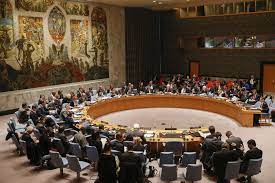United Nation Security Council:

The United Nation Security Council (UNSC) got five new non permanent members (Albania, Brazil, Gabon, Ghana and the United Arab Emirates).
- Estonia, Niger, St Vincent and the Grenadines, Tunisia and Vietnam finished their terms recently.
- Albania is joining for the first time while Brazil is taking an 11th turn. Gabon and Ghana each have been on the council three times before and the UAE once.
- More than 50 of the UN’s 193 member countries have never been elected to the council since its formation.
UNSC:
- The Security Council was established by the UN Charter in 1945. It is one of the six principal organs of the United Nations.
- The other 5 organs of the United Nations are—the General Assembly (UNGA), the Trusteeship Council, the Economic and Social Council, the International Court of Justice, and the Secretariat.
- Its primary responsibility is to work to maintain international peace and security.
- The council is headquartered at NewYork.
- Members:
- The council has 15 members: the five permanent members and ten non-permanent members elected for two-year terms.
- The five permanent members are the United States, the Russian Federation, France, China and the United Kingdom.
- India, for the eighth time, has entered the UNSC as a non-permanent member last year (2021) and will stay on the council for two years i.e 2021-22.
- Each year, the General Assembly elects five non-permanent members (out of ten in total) for a two-year term. The ten non-permanent seats are distributed on a regional basis.
- The council’s presidency is a capacity that rotates every month among its 15 members.
- Voting Powers:
- Each member of the Security Council has one vote. Decisions of the Security Council on matters are made by an affirmative vote of nine members including the concurring votes of the permanent members.
- A “No” vote from one of the five permanent members blocks the passage of the resolution.
- Any member of the United Nations which is not a member of the Security Council may participate, without vote, in the discussion of any question brought before the Security Council whenever the latter considers that the interests of that member are specially affected.




